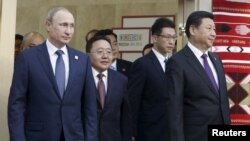The BRICS emerging nations said on Thursday they were worried about the volatility of global financial markets and oil prices and agreed to coordinate
efforts to keep their economies stable.
Leaders of Brazil, Russia, India, China and South Africa finally launched the group's largest initiatives to date - a development bank and a currency pool - and called at a summit for a swift deal on curbing Iran's nuclear program.
For Russian President Vladimir Putin, hosting the summit in the city of Ufa, the launch of the bank and the pool had been a key priority, as was the group's ability to sound more unified than at some previous meetings.
"We are concerned about the instability of the markets, the high volatility of energy and commodity prices, and the accumulation of sovereign debt by a number of countries," Putin said.
"These imbalances affect the growth rate and our economies. In these circumstances, the BRICS states intend to actively use their own resources and internal resources for development," he added, without giving details.
Frantic efforts by Beijing to stem a stock market rout helped Chinese shares bounce back on Thursday after tumbling for more than a week, but the costs of the heavy-handed state intervention are likely to weigh on the market for a long time.
Chinese President Xi Jinping refrained from comments about the slump, saying only that there are "difficulties" in the global economy, but urged the BRICS to increase coordination.
"Let's go hand-in-hand to build a great BRICS partnership," he told the group.
The BRICS account for a fifth of the world's economic output and 40 percent of its population.
More unity?
For Russia, hit by Western sanctions over its role in the Ukraine crisis that have cut off access to Western funding, thwarted investment and contributed to an economic downturn, greater cooperation among the BRICS nations is key.
Its economy has also suffered because of the fall in the global price of oil, its main export, and it has been looking for new markets since relations with the West sank to their lowest point since the Cold War over the Ukraine crisis.
But the diverse group, which has been meeting regularly since 2009, has struggled to come up with unified actions, often instead focusing on criticising the West.
The group's New Development Bank has taken more than three years to be established with tough negotiations on funding, headquarters and personnel issues.
The bank, which is to start lending no earlier than next year, is to have $50 billion in starting capital which will be doubled within the next few years and focus mainly on issuing debt for infrastructure projects.
"The New (Development) Bank will help finance joint, large-scale projects in transport and energy infrastructure, industrial development," Putin said.
Russia's increased focus on Asia since the crisis in Ukraine began has brought some successes: on Thursday its finance minister said China had bought around $1 billion worth of Russian domestic bonds this year.
The group called in a summit declaration for a swift permanent agreement on curbing Iran's nuclear program in exchange for relief from economic sanctions.
The language of the statement was careful, and devoid of finger-pointing.
Russia and China are part of the talks between Iran and six major world powers.
The BRICS called for "the normalization of trade and investment with Iran" and said any deal should "provide for the comprehensive lifting of sanctions imposed on Iran".
The group also issued a statement on the conflict in Ukraine, calling for full implementation of an agreement reached in February on ending fighting between pro-Russian separatists and pro-Kyiv forces in east Ukraine.





